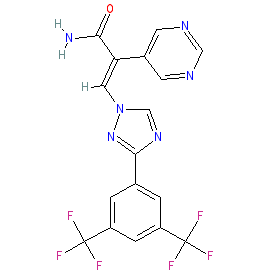GtoPdb is requesting financial support from commercial users. Please see our sustainability page for more information.
|
Synonyms: KPT-8602 | KPT8602
Compound class:
Synthetic organic
Comment: Eltanexor (KPT-8602) is a second-generation, orally bioavailable, selective inhibitor of the nuclear export protein XPO1, that works in the same way as its first-in-class relation selinexor. In comparison to selinexor, eltanexor exhibits much lower brain penetration, and this appears to reduce the central nervous system-mediated side effects of anorexia and weight loss detected with selinexor therapy [1]. Eltanexor is being investigated for therapeutic antineoplastic potential [1-3].
|
|
|||||||||||||||||||||||||||||||||||
| No information available. |
Summary of Clinical Use  |
| KPT-8602 is being evaluated as a single agent in Phase 1/2 clinical trial NCT02649790, in patients with relapsed/refractory cancers (both haematological and solid tumours). |
Mechanism Of Action and Pharmacodynamic Effects  |
| XPO1 is the major facilitator of nuclear export of key tumour suppressor proteins (TSPs) including p53, p73, BRCA1/2, pRB and FOXO. Cancer cells may overexpress XPO1 and this leads to mislocalisation of TSPs to the cytoplasm and allows cancer cells to defeat TSP-regulated apoptosis, and to proliferate in an uncontrolled manner. Pharmacological inhibition of XPO1 prevents XPO1-mediated nuclear export of TSPs, and restores their accumulation in the nucleus, and thie pro-apoptotic function in damaged cancer cells. As XPO1 is minimally expressed in normal cells these are spared the cytotoxic effects of eltanexor that manifest in cancer cells. Haematologic tumours are particularly susceptible to apoptosis induction by XPO1 inhibition, and these cancers are a major target of clinical trials of XPO1 inhibiting compounds [1,3]. |
| Clinical Trials | |||||
| Clinical Trial ID | Title | Type | Source | Comment | References |
| NCT02649790 | Study of the Safety, Tolerability and Efficacy of KPT-8602 in Patients With Relapsed/Refractory Cancer Indications | Phase 1/Phase 2 Interventional | Karyopharm Therapeutics Inc | ||






